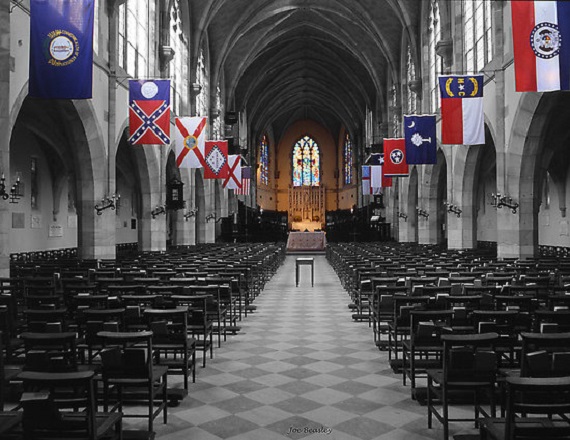Thomas Jefferson founded the University of Virginia in an effort to combat the “dark Federalist mills of the North” and keep Virginians home for their higher education. He was not alone in this endeavor. It had been customary for Southerners to travel north or to Europe for their advanced degrees, but by the middle of the nineteenth century, several institutions of higher education had been established in the Southern states and all featured rigorous academic standards that rivaled their Northern counterparts.
Most of the men who served in these institutions picked up the sword to defend the South in 1861. The entire student body at several Southern institutions enrolled in the Confederate army. Southern higher education and the defense of the South, both physically and intellectually, were synonymous for many years after the War ended. Two small liberal arts colleges stood above the rest in this regard: The University of the South and Washington and Lee University. The University of the South maintained a strict devotion to Southern principles after the War and Robert E. Lee served as president of what became Washington and Lee University from 1865 until his death.
Yet, no one should be surprised by the recent turn of events at Washington and Lee. It has happened before. By the late 1990s, The University of the South had changed its name—Sewanee—had removed Confederate symbols from its All Saints Chapel, had “lost” its ceremonial baton which featured images of the Confederacy, and had abolished several traditions, most importantly the strict dress code for both students and faculty. A university founded in part by Confederate General Leonidas Polk with the express purpose of distancing higher education from Northern influences had caved to…Northern influences, or more properly the distortion of history and culture by “those people” as Lee called them.
This is a trend that has accelerated in recent years. Every name, custom, or emblem linking a college or university to its antebellum Southern past is under assault. College is a multi-million dollar business driven by enrollment and “inclusion.” University presidents get better jobs or bigger paychecks when they can point to buildings, endowments, and enrollment growth during their tenure. See current Washington and Lee President Kenneth P. Ruscio’s “accomplishments” at the school. Many of the most prestigious Southern institutions have become homes for carpetbag presidents with little understanding of the South, Southern culture, or Southern education. They look at the South as a series of backwater provinces ready to be enlightened by their superior intellect.
Sadly, even many Southern “academics” clamor to prove how backward their section was (and is) and how its remembered past has been wrong since the beginning. These Southern academics are so eager for recognition and acceptance by the American collective, i.e. acceptable opinion, that they readily distance themselves from the “sins” of their ancestors. Quite simply, they argue, Southerners lie. In their mind, Southern history is filled with “myths” and embellishments designed to sweep away or veil the ugly truth of the Southern mind. The post-bellum accounts of the War, secession, and Southern history were blatant revisionism designed to soften the blow of Reconstruction and hasten inclusion in American society. Southerners, then, are little more than disingenuous fools who need “reconstructed” intellectuals to help them understand their “true” history.
“Southern Studies” programs are in large part responsible for this trend. While often housed in university history departments, their proper home should behavioral science. Southerners are specimens to be dissected under a microscope, lab rats given cheese and electric shocks to determine behavior, and they, unlike their Northern masters, are predictably animalistic in their routines, driven only by lust, hate, and greed. See for example the Thomas Jefferson/Sally Hemings “affair” now considered historical fact, or a thesis from a graduate student at the University of Delaware on the grand Louisiana Belle Grove plantation where he assumes, with no evidentiary support, that the reason the large hospital for slaves was located near the main home was to intimidate and show the majesty of the “master class.” You see, Southerners cannot be humane. There had to be some insidious reason for providing medical care for sick and wounded African-Americans.
The mainstream academy has been lost for years, and the Washington and Lee fiasco is simply more proof that even historic Southern colleges are destined to capitulate to tide of fashionable opinion. Higher education stopped being about education and the free exchange of ideas many years ago. Endowments, new buildings, administrative salaries, and athletic programs drive university decisions and budgets. Kenneth Ruscio obviously calculated that his decision to remove the flags from Lee’s tomb will increase enrollment and fill the university coffers. Thus, like most conclusions drawn by carpetbaggers, it was not based on “diversity,” or even history and tradition, but money. Washington and Lee can now claim they have exorcised their Confederate demons and have caught up with the times. This won’t stop. The only solution is to do what Jefferson, Polk, and others did in their quest to preserve the culture and education of their communities in the antebellum South: found new institutions and ignore the old. It is only in this way that the South can be saved. The Abbeville Institute is part of that process.







